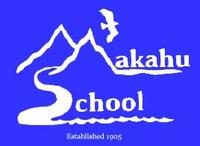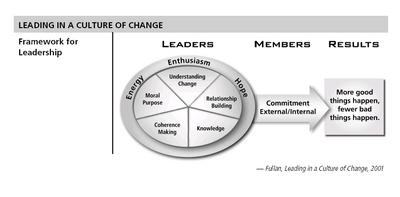Thursday 27 October 2005
Ed Tech to Tech Ed in an Afternoon
It is interesting to note the common themes emerging from the tech world similar to our own - i guess they are following the trends to meet our tech. needs...
Covergence (integrated systems), Wireless, communication portals, content managment (analog to digital) & security.
I had a deja vu experience listening to Tandburg (backup systems) talk about the exponential growth in data (we know it as the information explosion) - our angle is how we navigate this for learning (Infoglitz, Infoglut, Infogarbage) - their angle is how to protect the data
Test your backup systems!!!!!!!!! Delete a file (make sure its not important) - go back a week later and use your backup system to restore it - do it now - just to make sure that you can...
Communication portals - intranet/extranet software solutions - phew so expensive - haven't they heard of Moodle
No open-source in sight of course (it's their business to sell this stuff) & funny that none of them had heard of the Pringle can wireless enhancer!!
I thought this HP Digital Pen was really cool - convert handwritten & printed hard copy to digital form - i know this is a big issue for our secondary schools (TaraNet Cluster) particularly who are trying to get their teachers work (traditionally pen & paper) into digital form for sharing.
Though a lot of the presentations went over my head - i did manage to get the gist of most it. Thanks to Gen-i (formerly Computerland) keeping me in the loop :-)
How Many Smart Boards?????
 © FNO Press, 2005
© FNO Press, 2005 Copyright Policy: While the copyright for this cartoon by Jerry King belongs to From Now On, readers may distribute and republish provided they reproduce the credit with a link to Jerry's Web site http://www.jerryking.com/ and to From Now On http://fno.org.
Really??!! ;-)
Spent the day with lead teachers working out some ideas to help move teachers forward in integrating ICTs in their classroom practice ...
Working on Gladwell's 'Law of the Few' - "With the adaptions of innovations into a system you have the Early Adaptors to move this along to the Early Majority it is not an easy transition - here the Law of the Few is important as they help 'translate' for the rest of us - concentrate your resources on a few key areas." So our lead teachers are our key resource people - some been with us for awhile, some just joining us for the first time - all enthusiastic, energetic & hopeful (Fullan 2001) - ready to help drive change in their own classrooms & in their schools - wahoo!! Jamie McKenzie gives some good advice for lead teachers in his articles:
Traits of an Effective Technology Coach
& How Teachers Learn Technology Best
Good reading for anyone working with teachers. Really looking forward to Jamie coming to work with us in 2006 - if you're not in our cluster and you want to join us Saturday June 10th 2006 - drop me a line :-)
Wednesday 26 October 2005
“I think the big mistake in schools is trying to teach children anything, and by using fear as the basic motivation.Fear of getting failing grades, fear of not staying with your class etc.Interest can produce learning in a scale compared to fear as a nuclear reaction to a fire cracker!
Visit Bruce's Blog!!! Thx Richard
Looking forward to Bruce joining us in a few weeks to challenge our thinking more & to move us from just thinking about things to taking action & making real change...
Friday 21 October 2005
Treat your Password Like Your Toothbrush...
So don’t use silly password such as Fred! (or such like ;-)

Phew some pretty powerful computer forensic software demonstrated to us today – you can delete, you can move things around, but you can’t hide anything! Yes Henry you will need to ‘wipe’ your hard drive – formatting does not remove data from your machine – a screwdriver through the hard drive will but I think the MOE want those teacher laptops returned to Wellington.
Really interesting activities involving searching for hidden messages and pictures & then working out a response based on the NetSafety guidelines. Find the NetSafety Kit here
Trying to work out if something is inappropriate, objectionable or illegal, saw us searching for pictures of cats, chickens & cows!! As Yvonne so aptly put it Hornography & if it was a picture of a calf – even worse child hornography!!
Thanks to
Wednesday 19 October 2005
EPS
Had a short time at staff meeting to introduce the DLOs (Digital Learning Objects) to the EPS staff - which turned into a bit of a fizzer as Firefox doesn't play a lot of them - i think something to do with the ActiveX on the pages (Firefox doesn't support ActiveX- which is one reason it is a more secure browser than Internet Explorer). I hate wasting teachers' time at staff meetings specially with technical difficulties!! Oh well, we did in the end get to browse some of the collection, staff were interested and keen to try out some of the CHOCOLATE DLOs. (It was great to find a relevant resource - the DLO collection is not wide enough yet to make relevant connections to a lot of classroom topics) Some advice for teachers - plan a structured use of DLOs to support learning in the classroom (as you would any learning resource) I am a little worried because these resources are digital & some of them are pretty cool then they will be used randomly, out of context, perhaps as rewards (some teachers still do this!!) and not in the powerful ways they could be used. Before you begin to use DLOs with your kids i recommend you read this article from Learning Media - Quality Teaching Using Digital Resources.
Bernadette is really progressing on the web site maintenance and has learnt how to create new links and make new pages so the newsletters can be archived and available on line. The real challenge is file management – how you organize your files so you can link to the right ones, & upload the right ones. Looking good check out www.eltham.orcon.net.nz Lots more photogalleries to check out there too.
I know it’s not my job to do technical stuff but if it’s a 5 minute job it’s worth it if its going to make the difference with a teacher getting onto it with their kids. (Though we all know it’s rarely 5 minutes ;-) So there were a couple of little jobs like that & worthwhile doing too…

Jackie’s kids are starting a unit on Chocolate so they spent some time exploring KidPix and decorating chocolate cakes - you can see more of their yummy chocolate cakes here and there is a full lesson plan on our Interact site.
Friday 14 October 2005
Busting Busting

Busting, busting …
I never get sick of Making Movies… no I don’t really especially today working with such keen young film makers as the Douglas kids. Here is an outtake from TT productions entertaining little piece called ‘Flush’! The whole school had an awesome day planning & producing their films – they worked on PCs & Macs using Movie Maker & iMovie. My preference? iMovie by a long shot. Some tips for kids who work with me??? Never, never let Rachel touch your mouse – sorry Summa for deleting your movie – oops… You can see Flush here. Check out Dragon Production’s story about the cool huts they have been making. A popcorn & movie session at the end of the day was a great opportunity to celebrate their work!
Wednesday 12 October 2005
Bloggity, blog, blog, BLOG @ Makahu
 This post is for Eden @ Makahu to let you know about what we did today in your school. (This was the original purpose of me blogging "A Journal of What Rachel is doing in Schools." but i have branched out a little bit lately into other discussions)
This post is for Eden @ Makahu to let you know about what we did today in your school. (This was the original purpose of me blogging "A Journal of What Rachel is doing in Schools." but i have branched out a little bit lately into other discussions)Anyway - I worked with some students & Phillipa (for a little while) setting up a blog for Makahu School. If you're reading this now it's quite likely that you know what a blog is :-) but for the uninitiated just checking things out for the first time basically blogs are free (usually) online tools that are beginning to be used more widely in education – they are more interactive than a static web page as blog visitors can leave comments on each other’s pages and also they are really easy to use. You can set rss feeds on blogs (put one on your's Eden) and subscribe to other people's blog feeds so you can keep up-to-date with recent postings. They come into a new 'genre' of web tools that has been tagged 'social software' - things like blogs, wikis, podcasting etc - aka Web 2.0. You really need to read around to learn more about the tools - try Wikipedia as a starting point - I'm not going to write about all that here - phew!
The ways we can use them in education we are only just beginning to realise so it's very exciting. The downside (maybe) is that your kids are out there in the open on the www, so there are some potential issues you will be well aware of. So when we were setting up the blog today we discussed those issues – eg not giving out personal information & how to deal with inappropriate comments etc. When setting up this blog i made sure that any blog posts or comments were also sent to Eden's email so he can monitor the activity on his school blog. There are some tools out there worth a look at that provide a more closed environment (for example we use Interact that you have to access through a username & password). Blogmeister is one i have been meaning to get around to checking it out. Tom from The Orchard - link bottom right of this blog uses it - costs a small amount but more control for the teacher - if thats what you want... There are lots of links i could send you too but don't have the time right now - Google it - find out more - use it!
Tuesday 11 October 2005
Flat Stanley @ Tahora

Kids at Tahora School have been Flat Out working on their Flat Stanley project. They have been reading Flat Stanley stories, taking Flat Stanley back to their farms for the holidays and taking lots of photos & telling Flat Stanley PowerPoint stories with them, they have been emailing buddies at an Auckland school and sharing their stories. Today they showed awesome creative, cooperative, and problem solving skills - along with a good measure of patience & persistence to create their Flat Stanley claymation. Here Flat Stanley becomes a kite and gets stuck in the tree!! Good on you guys. Today we fixed an rss feed on their blog so pop over and leave them a comment they'd love to hear from you.
Sunday 9 October 2005
Podcasting
A lot of buzz about podcasting in recent conferences.
What is podcasting? Well it’s basically about subscribing and listening to audio feeds through the Internet. A bit like a ‘pick & mix’ of your own radio – when & where you want to listen to it. Portable mp3 players have really pushed this along - you can download to your laptop, your phone even & listen on the go. Also anyone can produce & broadcast their own shows (not that you’d want to listen to anything) – but it really makes it accessible for all (well those with the gear & the internet access but that’s another story) & it’s a democratizing media – we no longer have to be passive consumers of someone else’s stories or point of view but we get to shape the media ourselves. I won’t go too far down that track either but I’m sure you could write a thesis about it
Andy Carvin’s Waste of Bandwidth
Bit by Bit – Bob Sprankle
Bud the Teacher
Connect Learning with David Warlick
Ed Tech Coast to Coast
Paradigm Shift
Teach 42
(you can find these in the iTunes directory – they are all ‘edtech’ type podcasts)
What do you recommend??
Radio WillowWeb
Story Cast
Acclerated Reader Books
KPE (Point England NZ – Book reviews)
I have been searching high & low for ‘stories’ for Sophie – really there’s not a lot around …early days yet. Because this is a democratic media we actually have the ability to contribute to this & LibraVox are looking for readers to podcast ‘opensource’ books (including children’s books) Class project – maybe???
You can edit in audacity (freeware) or garageband on your mac.
Hosting your mp3 files podcasts is an area we need to investigate further – you don’t really want them on your own webhosted area – they will take up a bit of space and then there’s the bandwidth use as people access & download your files. There are a few recommendations and I guess you will look at them more closely when you have some podcasts ready to go…let us know!
The Education Podcast Network
Otherwise Google it – let us know if you find some good ones!
Leading in a Culture of Change
 A must read from Michael Fullan
A must read from Michael Fullan Saturday 8 October 2005
From 64211732448, see below for replying to my Vodafone mobile
hows this just testing mobblog
For a limited time only you can send one free email reply straight to this Vodafone mobile! The reply can be up to 140 characters and will appear as a text message. You've got 14 days from the time of receiving the email to send a reply so don't miss out.
Vodafone is not responsible for the content of this email or your reply. Vodafone makes no representations in relation to the transmission of your reply.
Monday 3 October 2005
Implementing ICT
Implementation within our cluster has involved in the first place building relationships across our schools, Principals working together to develop a vision about the way they want their schools to work. I think this is what Julia Atkins calls ‘Educative Purpose’ – the WHY, Why are we doing this? Once you work out the why – which is based on our beliefs, then the what & the how will follow. Knowing the answers to our WHY questions maintains a focus and keeps us moving forward in the same direction. Principals & some ‘lead’ teachers went on a Bus Tour around other schools which had been held up to be showing examples of good practice. The discussions we had while & after visiting these schools and the workshops we have had since, has really helped them in forming a bigger picture of what we think is important in their schools. Principals are the ones who give license to our teachers to be innovative, creative and take risks; they provide the access to resources – improving infrastructure, finding money for extra PD release time; they communicate with the community about what is happening in our schools and so in effect ‘we are all dancing to the same tune’. Well that’s the rosy picture the reality of it in some schools is what is happening for the individual teacher in the classroom and what is the effect for our kids. We are asking questions now like “Why do I not see any changes in many of our classrooms?” “What are the benefits for our kids – does it improve learning outcomes, how do you measure it, should you measure it…?” At the end of the day its about making a difference in our classrooms – if all of our teachers have laptops, if the whole school is networked, if they have access to data display, mobile pods of computers, they have loads of PD opportunities, facilitator support in the classroom – then what, save a magic wand (by the way I do keep one of these in my office & try & use it from time to time but unfortunately it doesn’t work) what else do we need to do????
Do we keep working with our teachers but with a higher expectation that they will come on board? I know that in some of the